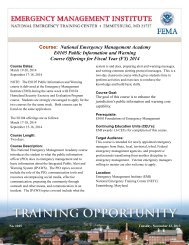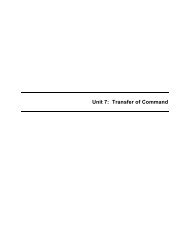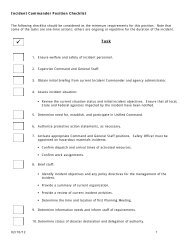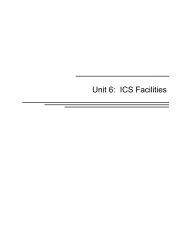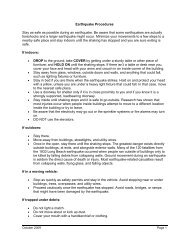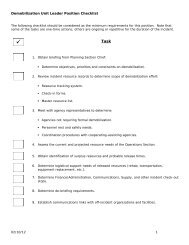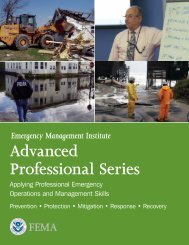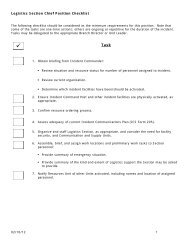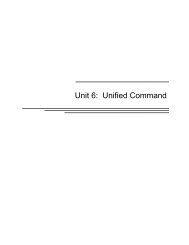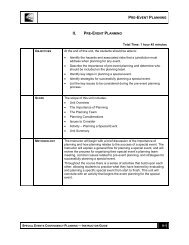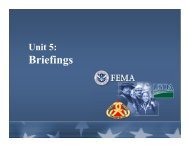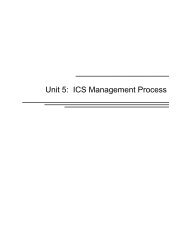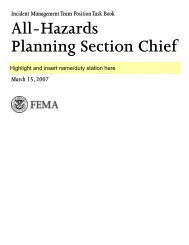enrollment for emi courses - Emergency Management Institute ...
enrollment for emi courses - Emergency Management Institute ...
enrollment for emi courses - Emergency Management Institute ...
You also want an ePaper? Increase the reach of your titles
YUMPU automatically turns print PDFs into web optimized ePapers that Google loves.
InDEpEnDEnt stuDy<br />
cOursEs<br />
EmE r g E n c y ma n a g E m E n t In s t I t u t E • 2010-2011 • ca t a l o g of co u r s E s<br />
national Incident management system<br />
(nIms) communications and In<strong>for</strong>mation<br />
management (Is 704)<br />
This course introduces participants to the<br />
communication and in<strong>for</strong>mation management<br />
component of NIMS. NIMS provides a consistent<br />
nationwide template to enable all government,<br />
private-sector,andNon-GovernmentalOrganizations<br />
(NGOs) to work together during domestic incidents.<br />
Effective emergency management and incident<br />
response activities rely on flexible communication<br />
and in<strong>for</strong>mation systems that provide a common<br />
operating picture to emergency management/<br />
response personnel and their affiliated organizations.<br />
Establishing and maintaining a common operating<br />
picture and ensuring accessibility and interoperability<br />
are the principal goals of the communication and<br />
in<strong>for</strong>mation component of NIMS.<br />
CEUs: .2<br />
Study Hours: 2<br />
national Incident management system<br />
(nIms) Intrastate mutual aid—an<br />
Introduction (Is 706)<br />
This online course provides an introduction to NIMS<br />
intrastate mutual aid and assistance. Participants will<br />
learn about the purpose and benefits of mutual aid and<br />
assistance, and the emphasis that NIMS places on mutual<br />
aid and assistance. The course explains how to develop<br />
mutual aid and assistance agreements and mutual aid<br />
operational plans. Course objectives include:<br />
• Describe the purpose, benefits, and uses of<br />
mutual aid and assistance.<br />
• Explain how mutual aid and assistance<br />
agreements relate to NIMS.<br />
• Identify what in<strong>for</strong>mation should be included in<br />
a mutual aid and assistance agreement.<br />
• Explain the process <strong>for</strong> developing mutual aid<br />
and assistance agreements.<br />
• Identify the elements of a mutual aid and<br />
assistance operational plan.<br />
FEd E r A L Em E r g E N C y mA N A g E m E N T Ag E N C y 160<br />
This course is designed <strong>for</strong> State, local, and Tribal<br />
emergency response and coordination personnel<br />
and takes approximately 2½ hours to complete.<br />
CEUs: .2<br />
Study Hours: 2½<br />
<strong>Emergency</strong> Operations center (EOc)<br />
management and Operations (Is 775)<br />
This course describes the role, design, and functions of<br />
EOCs and their relationships as components of a Multi-<br />
Agency Coordination System. The course contains<br />
disaster-related examples, activities, and case studies that<br />
relate to EOCs and Multi-Agency Coordination Systems<br />
at the local, State, and Federal levels of government.<br />
CEUs: .4<br />
Study Hours: 4<br />
national response framework (nrf), an<br />
Introduction (Is 800.b)<br />
This course is intended <strong>for</strong> government executives,<br />
private-sector and Non-Governmental Organizations<br />
(NGOs) leaders, and emergency management<br />
practitioners. This includes senior elected and appointed<br />
leaders, such as Federal department or agency heads,<br />
State governors, mayors, Tribal leaders, and city or<br />
county officials—those who have a responsibility to<br />
provide <strong>for</strong> effective response. This course introduces<br />
participants to the concepts and principles of the<br />
National Response Framework. At the end of this<br />
course, participants will be able to describe:<br />
• The purpose of the National Response Framework.<br />
• The response doctrine established by the National<br />
Response Framework.<br />
• The roles and responsibilities of entities as<br />
specified in the National Response Framework.<br />
• The actions that support national response.<br />
• The response organizations used <strong>for</strong> multi-agency<br />
coordination.<br />
• How planning relates to national preparedness.<br />
The course is available on the Independent Study<br />
web site.



